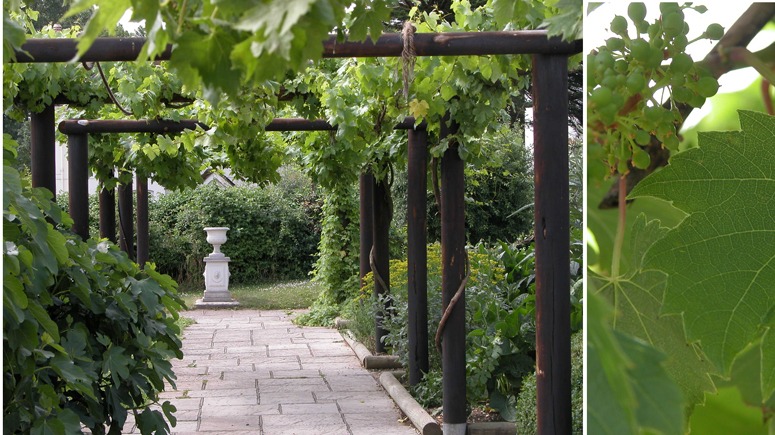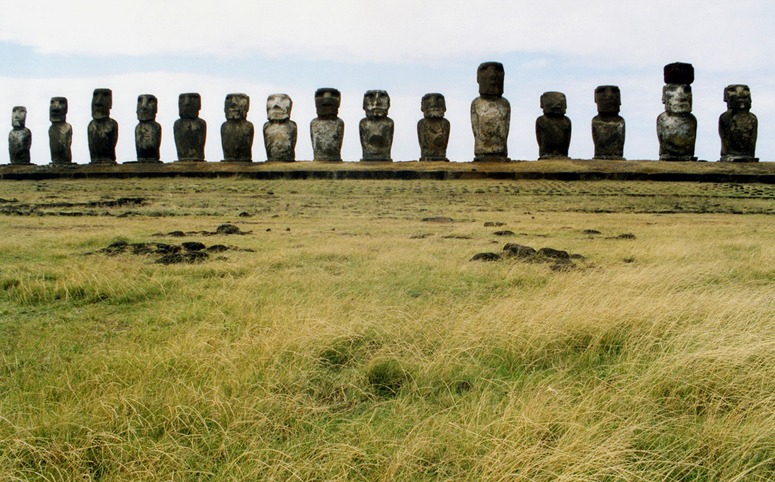 When John Harvey became President of the Garden History Society, in 1984, the great medieval historian suggested bringing back the grape vine as an ornamental plant. He explained that: ‘From very early times until the eighteenth century the vine was one of our chief garden plants, quite apart from attempts to make wine in England or to obtain dessert grapes – though both these enterprises had considerable success. As a climber, against walls or used to cover arbours and tunnels, the vine is outstandingly beautiful and, in several varieties, completely hardy in most of Britain. This is brought home to us when we realize that one of the largest and oldest vines ever grown was in the open air in the High Street of Northallerton, surely one of the coldest and draughtiest towns in England. The grape-vine was, and could be again, one of the greatest beauties of our gardens.’ (Journal of the Garden History Society, Spring 1984, p.5). The seemingly ever-warmer summers with which Global Warming threatens to bless England reinforces Harvey’s suggestion: Bring Back The Grape Vine.
When John Harvey became President of the Garden History Society, in 1984, the great medieval historian suggested bringing back the grape vine as an ornamental plant. He explained that: ‘From very early times until the eighteenth century the vine was one of our chief garden plants, quite apart from attempts to make wine in England or to obtain dessert grapes – though both these enterprises had considerable success. As a climber, against walls or used to cover arbours and tunnels, the vine is outstandingly beautiful and, in several varieties, completely hardy in most of Britain. This is brought home to us when we realize that one of the largest and oldest vines ever grown was in the open air in the High Street of Northallerton, surely one of the coldest and draughtiest towns in England. The grape-vine was, and could be again, one of the greatest beauties of our gardens.’ (Journal of the Garden History Society, Spring 1984, p.5). The seemingly ever-warmer summers with which Global Warming threatens to bless England reinforces Harvey’s suggestion: Bring Back The Grape Vine.
The vine was probably introduced to England by the Romans and the image (courtesy Gauis Caecilius) is of a vine pergola at Fisbourne Roman Palace.
Monthly Archives: August 2010
The Easter Island Path to Perdition could show where humanity is heading
 Following the below comments on Attitudes to life, death and trees in western culture and ‘civilization’, I thank Anoldent, for his photograph and his account of the Fifteen Moai on Easter Island: ‘Moai were status symbols. The more you had and the bigger they were, the greater your village’s status. Unfortunately, moving them around the island required many trees, and when the last trees were cut on the once heavily forested island, the topsoil blew away, the islanders could no longer build fishing boats, or even escape the ensuing famine. Wars erupted and the culture collapsed. An environmental cautionary tale. The island is still largely treeless.’ On a larger scale, too many humans think this way: ‘the more you have the better you are’: more rooms, more people, more buildings, more cars, more economic growth. But for humans who inhabit an island or a planet, aiming for more may result in less. Let’s call it ‘the Easter Island Path to Perdition’, and let’s be sufficiently optimistic to believe that the ‘civilization’ of cities will be replaced by a sophisticated landscape urbanism.
Following the below comments on Attitudes to life, death and trees in western culture and ‘civilization’, I thank Anoldent, for his photograph and his account of the Fifteen Moai on Easter Island: ‘Moai were status symbols. The more you had and the bigger they were, the greater your village’s status. Unfortunately, moving them around the island required many trees, and when the last trees were cut on the once heavily forested island, the topsoil blew away, the islanders could no longer build fishing boats, or even escape the ensuing famine. Wars erupted and the culture collapsed. An environmental cautionary tale. The island is still largely treeless.’ On a larger scale, too many humans think this way: ‘the more you have the better you are’: more rooms, more people, more buildings, more cars, more economic growth. But for humans who inhabit an island or a planet, aiming for more may result in less. Let’s call it ‘the Easter Island Path to Perdition’, and let’s be sufficiently optimistic to believe that the ‘civilization’ of cities will be replaced by a sophisticated landscape urbanism.
